Your Guide to B2B CRM Transformation
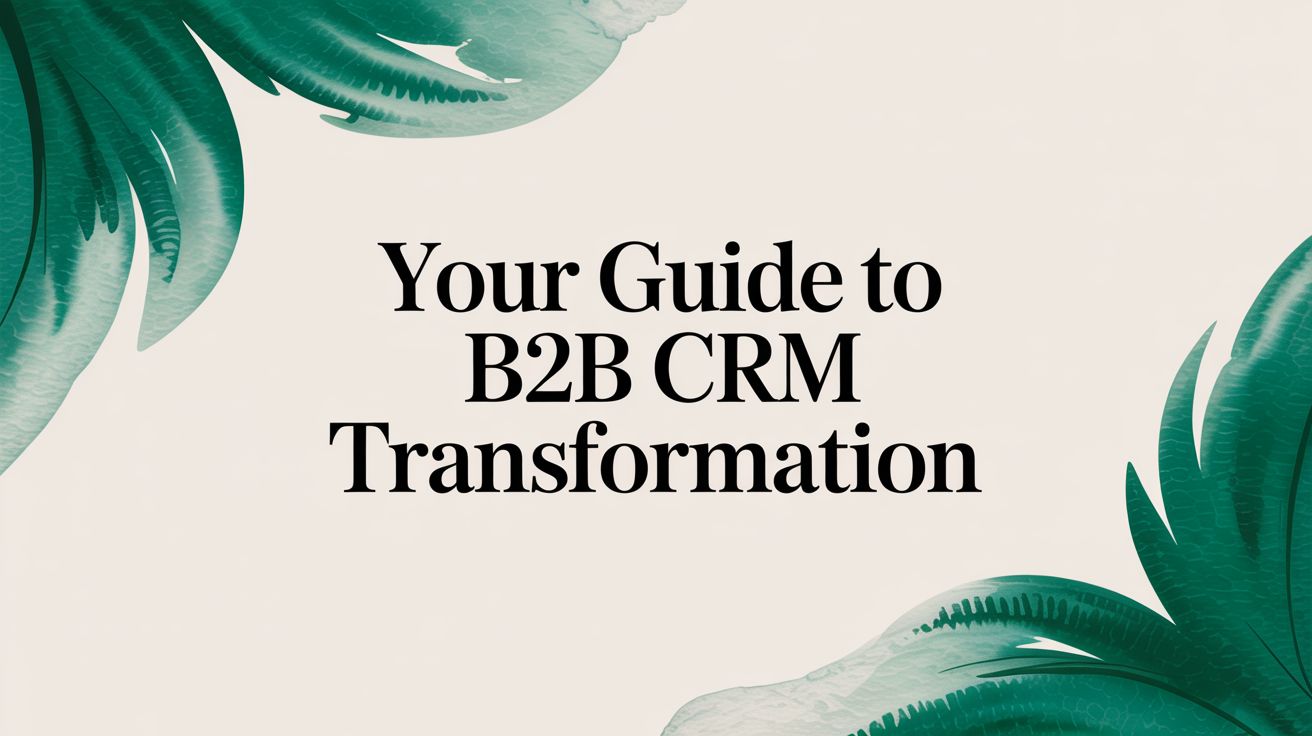
Think of a B2B CRM as the central nervous system for your entire client relationship strategy. It’s the one place where every single interaction across your sales, marketing, and support teams comes together to form a complete picture. More than just software, it's a strategic framework built specifically for the complex world of business-to-business sales.
What a B2B CRM Really Is and Why It Matters
Let's get past the textbook definitions. A B2B CRM isn't just a fancy digital address book. It’s the operational blueprint for building high-value, long-term business partnerships.
In B2B, you're rarely making a single, quick sale. You're navigating sales cycles that can stretch for months, persuading committees of decision-makers, and managing deals worth thousands—if not millions—of dollars. This is not a world where a generic, one-size-fits-all approach can possibly work. You need a system designed to track every touchpoint, from the first marketing email a prospect opens to the final contract negotiation and the ongoing support tickets that follow.
The concept map below shows how a B2B CRM acts as the central brain, connecting the most critical functions of your organization.
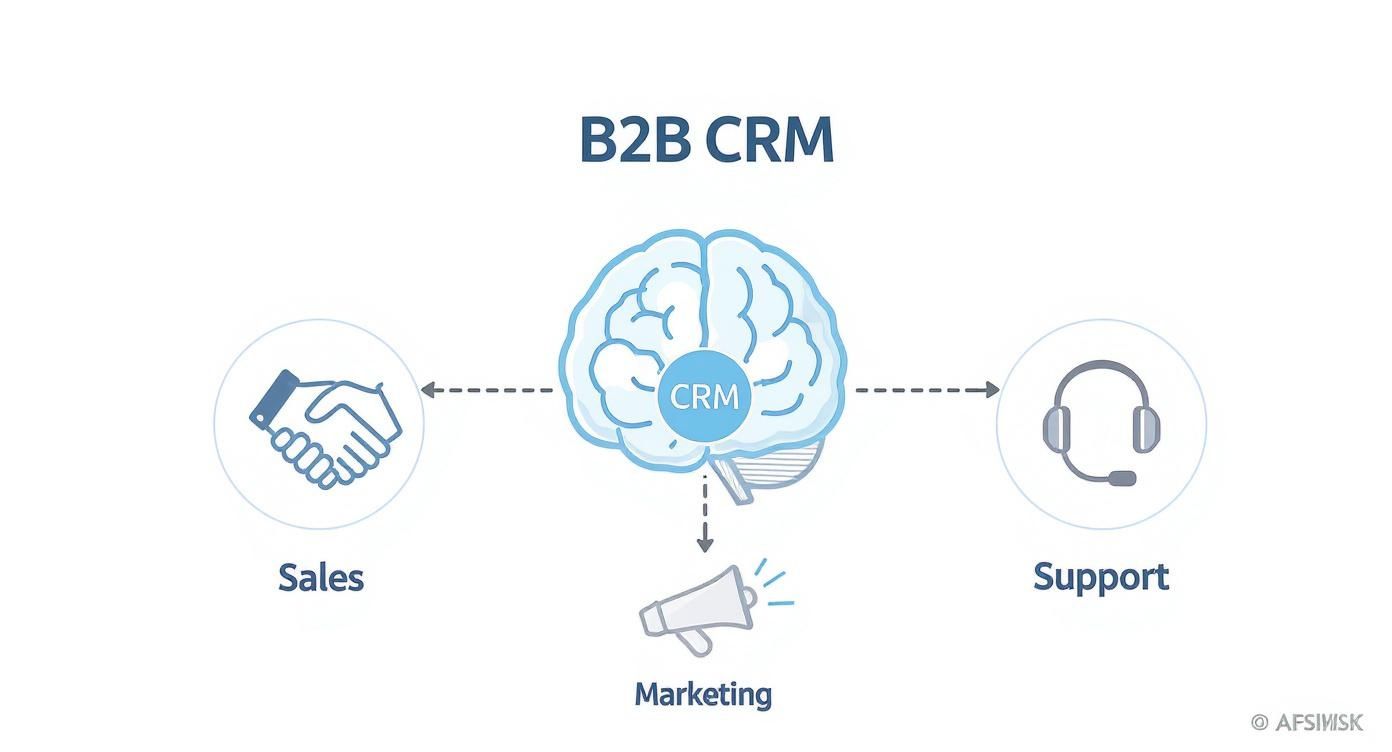
As you can see, its real power comes from unifying sales, marketing, and support into a single, cohesive system, not just letting them operate in silos.
The Strategic Framework for Growth
A B2B CRM creates a shared source of truth that gets your entire company aligned around the customer. When every team is working from the same playbook, the results are powerful.
- Sales teams can see a prospect’s complete interaction history, knowing exactly which marketing materials they’ve engaged with before ever picking up the phone.
- Marketing teams can finally track which campaigns are generating the most valuable leads, allowing them to double down on what works and cut what doesn't.
- Support teams get a 360-degree customer view, enabling them to provide proactive service that builds loyalty instead of just putting out fires.
This kind of alignment is absolutely crucial for navigating the winding path of the modern B2B buyer. By understanding every stage of that journey, you can build much more effective strategies. If you want to dive deeper into this, you might find our guide on building a B2B customer journey map helpful for visualizing this process.
Why a Specialized System is Non-Negotiable
The massive growth in the global CRM market proves its importance. Valued at USD 254.89 billion and projected to climb to USD 298.61 billion, it's clear this isn't a niche tool. In fact, 91% of businesses with over 11 employees now use a CRM.
But for B2B companies, a purpose-built system is what truly separates the leaders from the laggards. B2B CRMs are designed to handle specific challenges that B2C systems simply ignore.
A B2B CRM transforms your operations from reactive to proactive. It’s not about just managing contacts; it’s about anticipating client needs, spotting opportunities, and orchestrating intelligent engagement across the entire lifecycle of a business partnership.
Instead of just tracking individual consumers, a B2B CRM is built to manage entire accounts, map out complex organizational charts, and identify all the key stakeholders. It’s designed for a world where one deal might involve a project manager, a department head, a CFO, and a technical evaluator—all of whom need to be engaged differently.
Ultimately, it’s the engine that powers intelligent, personal, and profitable client relationships.
Essential Capabilities of a Modern B2B CRM
A generic, off-the-shelf CRM is a bit like a standard road map. It shows you the cities and the main highways, but that’s about it. A true B2B CRM, on the other hand, is more like having a full topographical survey combined with live satellite imagery. It doesn’t just show you where your clients are; it reveals the entire structure of their organization, pinpoints the key players, and maps out the clearest pathways to closing high-value deals.
These systems are built from the ground up to handle the messy reality of business-to-business relationships.

So, let's cut through the buzzwords and get into the core functions that give your teams the foresight they need to win. These aren't just features on a checklist. They're powerful tools that work together to create a single, unified view of every client and opportunity in your pipeline.
Mapping the Entire Account Universe
In B2B, you're never just selling to one person. You're building consensus across a whole team of buyers, influencers, and decision-makers, each with their own agenda. This is where a B2B CRM’s approach to contact management really shines. It's less about storing names and numbers and more about mapping the intricate web of relationships inside a target company.
Instead of just a flat list of contacts, a powerful B2B CRM lets you:
- Visualize Corporate Hierarchies: See exactly who reports to whom, so you can immediately identify the executives with real purchasing power.
- Identify Key Stakeholders: Tag contacts by their role in the buying process—like "Economic Buyer," "Technical Evaluator," or "End User"—to tailor your communication.
- Track Communication History by Account: Get a complete log of every email, call, and meeting held with anyone at the company, giving any salesperson instant context.
This deeper view stops your team from flying blind. It turns a chaotic buying committee into a clear roadmap of who to influence and when to do it.
Navigating the Sales Journey with Precision
B2B sales cycles are long and winding roads. They’re filled with demos, proposals, security reviews, and legal negotiations. A simple to-do list just won't cut it. That's why sales pipeline management is the beating heart of any effective B2B CRM.
Think of it as the playbook for your entire sales process. It breaks down the long journey into clear, manageable stages, showing you exactly where every single deal stands.
A well-managed pipeline does more than just track deals. It provides a real-time forecast of future revenue and highlights bottlenecks in your sales process before they derail your quarterly goals.
This visual clarity empowers sales leaders to coach their teams effectively and put resources where they'll have the biggest impact. It helps you answer the critical questions: "Which deals are at risk of stalling?" and "Where should we focus our energy this week to hit our target?"
Revealing Actionable Insights from Data
Data is useless without insight. A modern B2B CRM excels at turning raw information into a strategic compass with its advanced reporting and analytics. This is about moving beyond vanity metrics to uncover what truly drives revenue.
A good system makes it easy to build dashboards that answer your most pressing business questions:
- Which lead sources generate the highest customer lifetime value?
- What’s the average sales cycle length for deals over $50,000?
- Which sales rep has the highest conversion rate from demo to close?
These insights allow you to double down on what’s working and fix what's broken. Better yet, by connecting your sales data with marketing efforts, you can finally achieve true alignment between the two teams. For B2B SaaS companies, understanding how to connect these dots is fundamental. If you're looking to explore this further, our detailed guide on B2B marketing automation provides a practical framework for integrating these systems.
This integrated data empowers your entire organization to make smarter, faster decisions based on performance, not guesswork. The goal is to move from simply collecting information to actively using it to anticipate client needs and seize opportunities before others do.
How to Choose the Right B2B CRM
Picking a B2B CRM is one of the most consequential tech decisions you’ll make. This isn’t just another software subscription; it’s a strategic investment in the very foundation of your growth engine. The right system becomes a force multiplier for your team, helping them build better relationships and close bigger deals.
The wrong one? It becomes a source of friction, frustration, and missed opportunities. This decision is a chance to step back, take a hard look at how your teams actually work, and build a smarter path toward your revenue goals.

Resist the urge to jump straight to vendor websites and feature comparisons. The process starts by looking inward at your own operations. You need a crystal-clear picture of your unique challenges before you can even begin to find the right solution.
Define Your Sales Process
Every B2B company has its own rhythm, its own unique way of turning a lead into a loyal client. Before you evaluate a single platform, you need to map out the intricate steps of your current process. How does a deal actually move from A to Z in your organization?
- Map Your Workflow: Document every stage of your sales cycle. Don't just settle for generic labels like "Prospecting" or "Negotiation." Detail the specific actions, handoffs, and milestones that define each step for your team.
- Identify Critical Pain Points: Where do deals get stuck? Do your reps burn too much time on manual data entry? Is visibility into client communication a constant struggle? Pinpoint the exact moments of friction.
- Define Success: What does a "win" really look like for you? A shorter sales cycle? A higher average deal size? Better customer retention? Get specific and attach hard numbers to these goals.
Getting this foundation right is everything. For a deeper dive, our complete guide on the B2B sales process offers a solid framework for refining these very stages.
Key Evaluation Criteria for Your B2B CRM
Once you have that internal blueprint, you can start evaluating potential systems with a clear purpose. This isn’t about finding the CRM with the longest feature list; it's about finding the one with the right features that solve your problems.
1. Seamless Integration Capabilities
Your CRM will not live on an island. It needs to work well with the other tools your teams depend on every single day. Look for deep, native integrations with your marketing automation platform, your ERP for financial data, and your customer support software. A disconnected tech stack just creates data silos and kills efficiency.
2. Scalability for Future Growth
The CRM you pick today has to support the company you want to be tomorrow. You need to ask potential vendors the tough questions. How does the platform handle rapid user growth? What happens when you expand into new regions or launch new product lines? Can it scale without hitting a technical or financial wall?
Your CRM should be a launchpad, not a cage. Choose a partner that is built to grow alongside you, offering the flexibility and power you'll need as your team and client base expand.
3. Industry-Specific Functionality
Different industries have vastly different needs. A manufacturing company's CRM might need robust inventory tracking, while a SaaS business will live and die by its subscription management and churn analytics. Look for a system that already speaks your industry's language and solves its unique challenges right out of the box.
The sheer scale of investment in this area highlights its importance. Worldwide CRM spending is projected to hit around USD 53 billion over the next year. Tellingly, 73.8% of this spend comes from large B2B enterprises in sectors like Finance, Public Administration, and Technical Services, signaling a clear move toward powerful, specialized systems. You can find more insights on these CRM market trends on hginsights.com.
Ultimately, you’re not just buying software. You're looking for a true technology partner that gets your business and is invested in your success.
The Impact of AI in Your B2B CRM
Artificial Intelligence isn't some far-off concept anymore; it's a practical, powerful tool that’s actively changing how B2B teams get work done. When you add AI to your B2B CRM, you’re upgrading it from a simple filing cabinet into an intelligent partner.
Think of it like this: a regular CRM is a map, but an AI-powered CRM is a seasoned guide who points out the shortcuts, anticipates the roadblocks, and helps you navigate the entire journey to a closed deal.
This shift is all about giving your sales team back their most valuable asset: time. By automating the repetitive, data-heavy tasks that consume their day, AI frees them up to focus on what humans do best—building genuine relationships and solving complex problems for clients.
Turning Data Into a Decisive Advantage
The real magic of an AI-infused B2B CRM is its ability to spot patterns and predict outcomes that even the most seasoned sales leader might miss. It processes massive amounts of data in real-time to offer clear, actionable advice.
A traditional CRM tells you what has happened. An AI-powered one tells you what is likely to happen next—and why. That kind of foresight is a game-changer for B2B sales teams who are juggling long, complicated deals with lots of moving parts.
AI transforms your CRM from a passive database into a proactive advisor. It surfaces hidden opportunities, flags at-risk accounts, and guides your team to focus their energy where it will deliver the greatest results.
This intelligent guidance helps your organization work smarter, not just harder, making every single interaction more informed and intentional.
Practical Applications of AI in B2B Sales
Instead of talking in hypotheticals, let's look at the concrete ways AI actually improves a B2B CRM. These aren't futuristic ideas; they're tools that top-performing teams are using right now to get a serious edge.
Intelligent Lead Scoring: AI goes way beyond basic scoring rules. It analyzes thousands of data points—from website clicks to company size—to figure out which prospects are actually ready to buy, helping your team prioritize their calls with surgical precision.
Predictive Sales Forecasting: Forget relying on gut feelings and old reports. AI algorithms analyze your pipeline, deal speed, and individual rep performance to create surprisingly accurate revenue forecasts. This gives leadership a much clearer, more honest picture of the business's health.
Sentiment Analysis: Modern AI can read the room by analyzing the tone of client emails, support tickets, and even call transcripts. This gives your team a real-time pulse on customer happiness, flagging potential issues before they become serious problems.
The economic impact here is undeniable. The global market for AI-driven CRM is expected to hit roughly USD 11.04 billion. More importantly, AI-enabled systems help B2B sellers achieve a 15% increase in repeat sales and improve customer retention—metrics that are critical for long-term success. If you're curious about the numbers, you can explore more CRM statistics at digitalsilk.com.
These capabilities allow your sales and marketing teams to build much more effective strategies. If you're exploring how to put this tech to work, check out our guide on the top AI tools for B2B marketing and sales for more ideas. Ultimately, AI makes your B2B CRM a dynamic engine for growth, giving your team the power to build stronger, more profitable relationships with clients.
Implementing Your B2B CRM For Lasting Success
Let’s be honest: a powerful B2B CRM is only as good as its adoption. The most advanced software on the planet will just sit there gathering digital dust if your team doesn't actually use it. Real success isn't about just flipping a switch on new tech; it's about fundamentally changing how your people work, collaborate, and win deals together.
Think of this implementation less like an IT project and more like building a new, better home for your sales and marketing teams. You wouldn't start pouring a foundation without a detailed blueprint, and the same logic applies here. A rushed rollout guarantees confusion and resistance. A thoughtful, strategic approach, on the other hand, builds a foundation for serious growth.
This is your chance to get your team genuinely excited about what’s possible—a future with less mind-numbing admin and more time to do what they do best: build great client relationships.

Crafting a Strategic Rollout Plan
A smooth transition starts long before anyone logs into the new platform for the first time. It begins with a clear purpose and a plan that actually considers the needs of your people. The goal here is to build momentum and show immediate value, turning any initial skepticism into genuine enthusiasm.
First, you need to define what success actually looks like in concrete, measurable terms. Vague goals like "improve efficiency" are useless. You need to set clear objectives that matter in your team's day-to-day reality.
- Objective: Cut the time spent on manual reporting by 50% within the first 90 days.
- Objective: Increase lead follow-up speed by 30% in the first quarter.
- Objective: Improve sales forecast accuracy to 90% within six months.
Targets like these give the whole project a clear direction and give you a tangible way to measure the return on your investment.
Managing Data and People With Care
The two most critical—and often mishandled—parts of any CRM implementation are your data and your team. Get either one wrong, and you can derail the entire project before it even gets going. Data migration is easily the most underestimated challenge. It needs careful planning to make sure your new system starts with clean, accurate information, not a mess of outdated contacts and duplicate records.
The quality of your data will directly determine the quality of your insights. A successful CRM implementation is an opportunity to cleanse and organize your most valuable asset—your customer information.
Just as important is managing the human side of the equation. Your team needs more than a one-off training session; they need to understand the "why" behind this new tool. Make the training practical, specific to their roles, and focused on solving their biggest daily headaches. Show them exactly how the CRM makes their jobs easier, not just how it provides more data for the leadership team. Getting this alignment right is everything, and you can learn more about bridging the gap in our guide detailing 5 steps to align B2B marketing and sales.
Building Momentum for Long-Term Adoption
Big-bang rollouts where everyone gets access on the same day are incredibly risky. A much smarter approach is to start small, prove the concept, and build from there. This way, you minimize disruption and create a powerful feedback loop to refine your process as you go.
For a smoother journey, try a phased approach like this:
- Launch a Pilot Program: Hand-pick a small, motivated group of users to test-drive the B2B CRM first. Their honest feedback will be gold for catching issues before you go company-wide.
- Champion Early Wins: When your pilot group has a success, celebrate it publicly. Did they close a deal faster? Did they uncover a new opportunity using the CRM? Sharing these stories builds real excitement and proves the system’s value to everyone else.
- Provide Ongoing Support: Adoption isn't a one-and-done event. It doesn't end after the initial training. Set up a dedicated support channel, schedule regular check-ins, and empower a few internal "champions" who can help their peers.
By treating implementation as an ongoing journey, not a destination, you ensure your B2B CRM becomes a dynamic, indispensable part of how your company operates.
Measuring Performance and Driving Improvement
Think of your B2B CRM as more than just a digital filing cabinet for customer data. It’s not a static report card you glance at once a quarter. Instead, it’s a living, breathing engine for growth. The whole point of collecting all this rich client information is to build a powerful feedback loop—one that constantly helps you refine your sales process, strengthen relationships, and drive predictable revenue.
When you start seeing your CRM as a tool for constant improvement, your team’s mindset shifts. You move away from just tracking activities and start relentlessly optimizing for results. This is where the real progress happens.
It’s about getting past surface-level numbers and zeroing in on the outcomes that define genuine B2B success.
Identifying Metrics That Matter
In the complex world of B2B sales, not all data is created equal. Vanity metrics like "calls made" or "emails sent" don’t tell you much about what’s actually working. To build a high-performance sales organization, you have to measure the quality of your outcomes, not just the quantity of your effort.
Focus your team's attention on a handful of key performance indicators (KPIs) that give you a true read on the health of your sales pipeline and the strength of your client partnerships.
- Average Sales Cycle Duration: How long does it actually take to get a deal from that first conversation to a signed contract? If this number is consistently shrinking, you know your process is getting more efficient.
- Deal Conversion Rates by Stage: Where are deals getting stuck? Pinpointing the exact stage in your pipeline with the biggest drop-off rate tells you precisely where your sales process needs a tune-up.
- Customer Lifetime Value (CLV): This is the ultimate health metric for your business. A rising CLV is a clear sign you’re not just closing one-off deals but building lasting, profitable relationships.
- Pipeline Velocity: How quickly are good opportunities moving from one stage to the next? This metric combines deal size, win rate, and sales cycle length to give you a real-time pulse on your revenue momentum.
These outcome-focused metrics turn your CRM dashboard into a strategic command center. They guide your decisions with clarity and show you exactly where to invest your team's energy for the biggest possible return.
Creating a Culture of Continuous Optimization
Data is only useful when it leads to action. The most successful B2B companies use their CRM to build a culture of continuous learning and improvement, where insights are regularly discussed and turned into smarter processes.
A well-managed B2B CRM fuels a culture of data-driven excellence. It empowers every member of your team to see the direct impact of their work and identify new pathways to success.
This means you need a regular rhythm for reviewing performance. Schedule monthly or quarterly pipeline reviews where the team can dig into what’s working, diagnose bottlenecks, and brainstorm solutions together. This isn't about pointing fingers; it's about collective problem-solving.
When your team sees that their insights are valued and that the CRM is a tool to help everyone win, it stops feeling like a management chore and becomes a shared asset for growth. You empower your people to be active participants in building a more intelligent, responsive, and successful sales organization.
Got Questions About B2B CRM? Let’s Clear Things Up
Making a big tech investment always brings up a few last-minute questions, even when you have a solid plan. I’ve been through this process with dozens of B2B leaders, and the same practical concerns tend to surface. Let’s tackle the most common ones head-on so you can move forward with confidence.
Just How Secure Is Our Data in a Cloud-Based B2B CRM?
This is the big one, and for good reason. Data security is absolutely non-negotiable. The good news is that leading B2B CRM providers treat it with the seriousness it deserves, often investing far more in security than any single company could afford to on its own.
Think of it like a bank vault versus a safe in your office. Reputable CRM vendors use multi-layered security protocols, including things like end-to-end data encryption, frequent third-party security audits, and rigid access controls. They’re protecting not just your most valuable asset—your customer information—but their entire reputation. Before you sign anything, always ask to see their security certifications, like SOC 2 or ISO 27001, to make sure they meet the highest industry standards.
What's the Real Hurdle to Getting My Team to Actually Use It?
Honestly? The biggest challenge is almost always the perception that it’s just more work. If your team sees the B2B CRM as another administrative task—endless data entry with no clear payoff for them personally—they will find every excuse not to use it. Adoption doesn't come from a mandate; it comes from demonstrating direct, personal value to each user.
The secret to getting your team excited about a CRM is proving it makes their lives easier, not harder. You have to frame it as a tool that gets rid of grunt work, serves up game-changing insights, and helps them hit their numbers faster.
To get past this, your training needs to focus on solving their specific pain points. Show your sales reps how it automates the reports they hate building or how it instantly flags the hottest leads, giving them more time to actually sell. When they start seeing the CRM as a personal assistant, adoption will feel less like a chore and more like a no-brainer.
Can a B2B CRM Actually Connect With the Tools We Already Use?
Not only can it, but it absolutely must. A modern B2B CRM is built to be the central hub of your tech stack, not some isolated island of data. It should plug directly into the other essential tools your business runs on every single day.
- Marketing Automation: You need lead data and campaign engagement syncing seamlessly for a complete picture of the customer journey.
- ERP Systems: Connecting sales data with financials is critical for accurate forecasting and knowing your numbers cold.
- Customer Support Platforms: Giving your sales team a heads-up on support tickets helps them walk into conversations fully informed, creating a much better client experience.
Without strong integration capabilities, you end up with data silos, which is just another word for chaos. When every department is working from the same playbook, your B2B CRM goes from being a simple database to the engine that aligns your entire organization for growth.
Ready to build the sales and marketing engine that drives predictable revenue? Big Moves Marketing specializes in creating the positioning, sales tools, and launch strategies that help B2B SaaS startups win deals and secure market leadership. Let's discuss your go-to-market strategy.
%20-%20Alternate.svg)
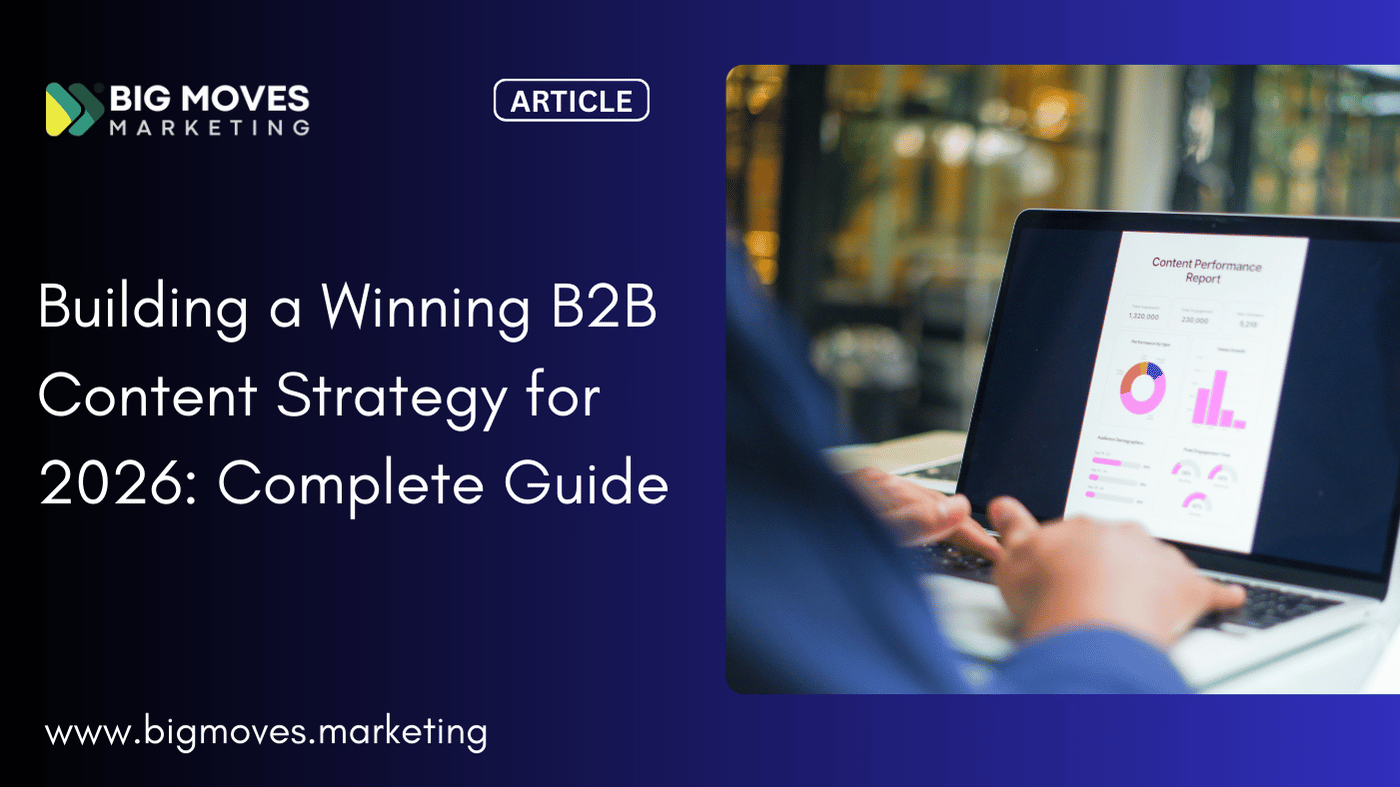

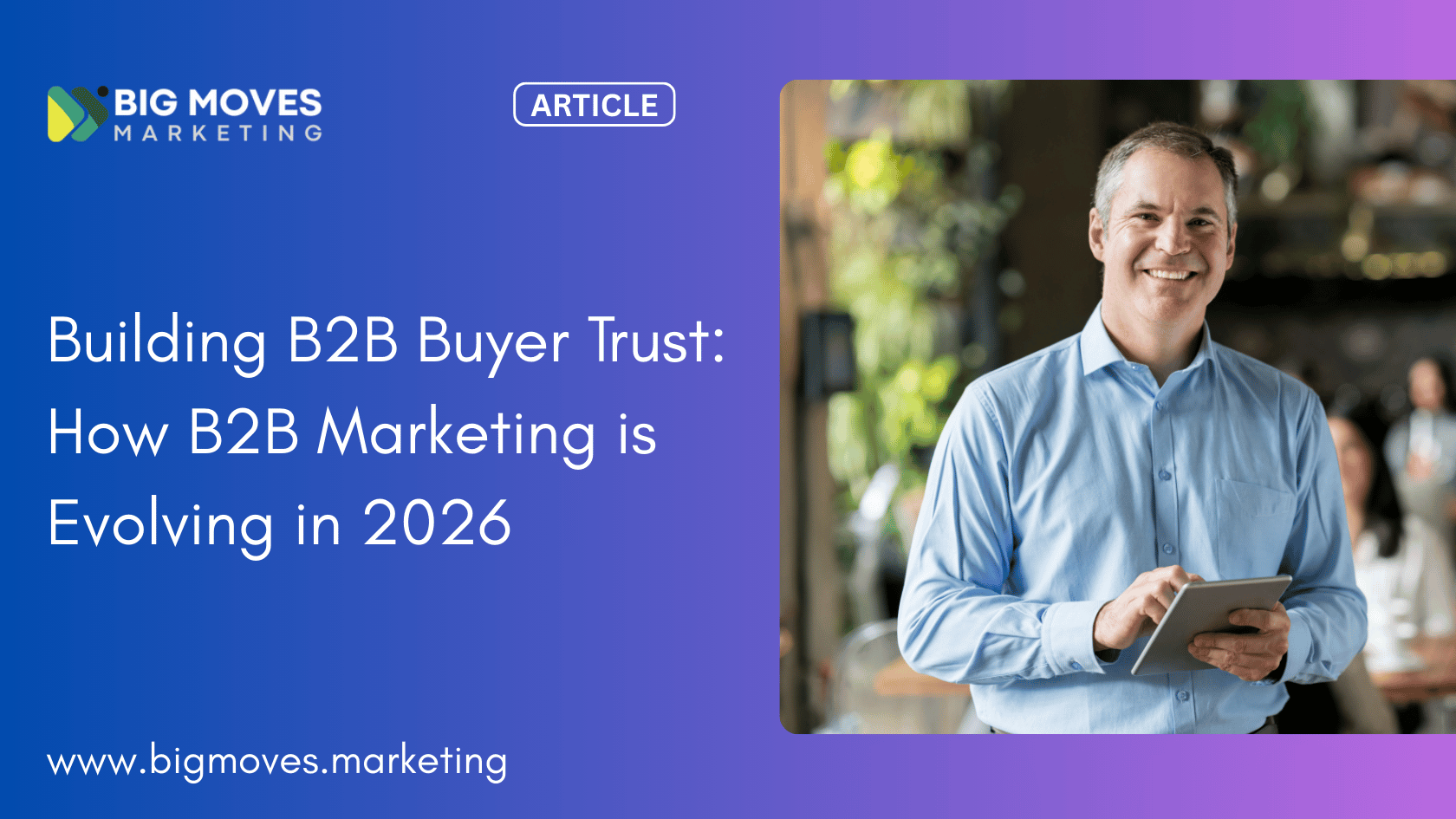


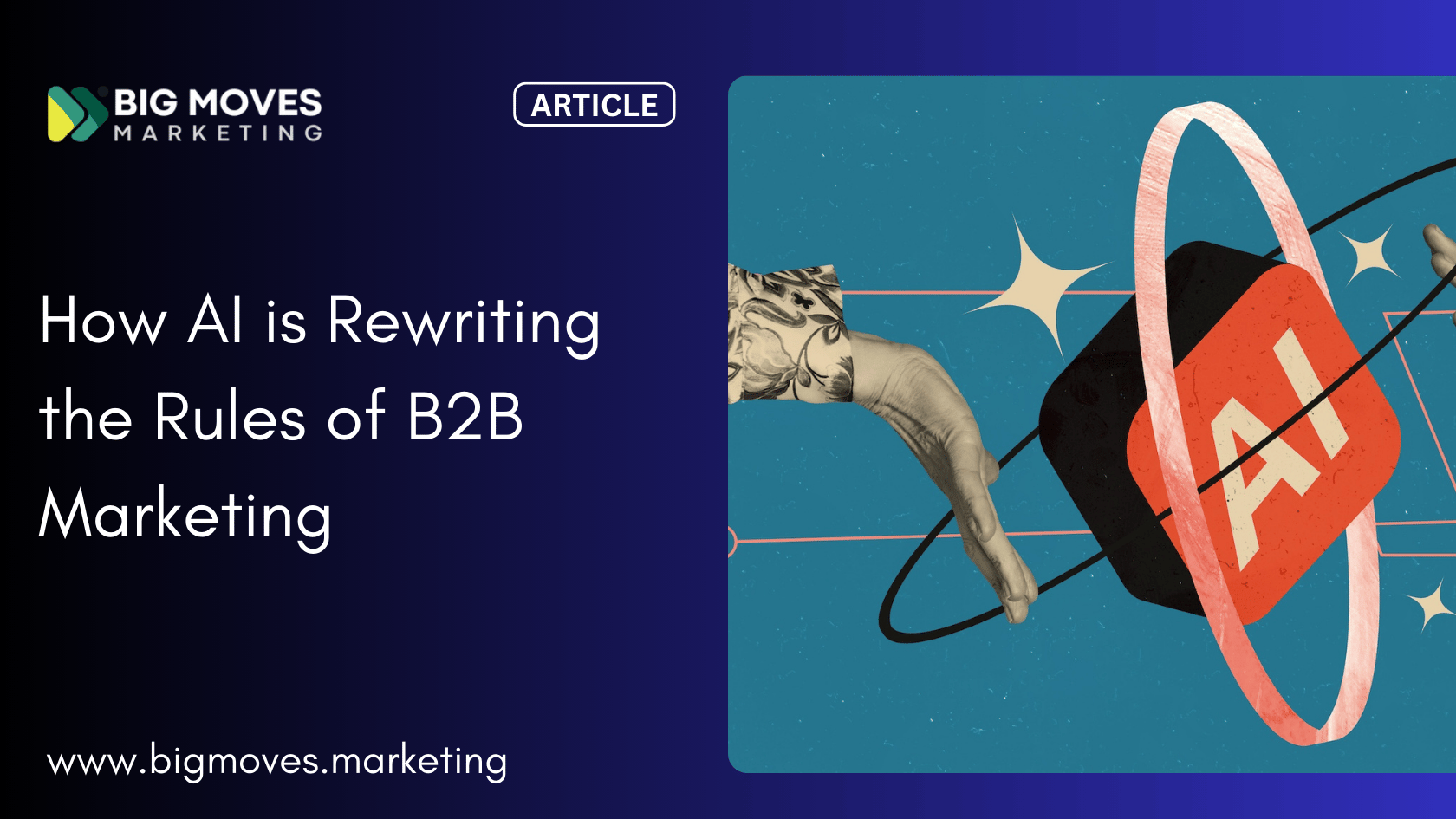
%20-%20white.svg)